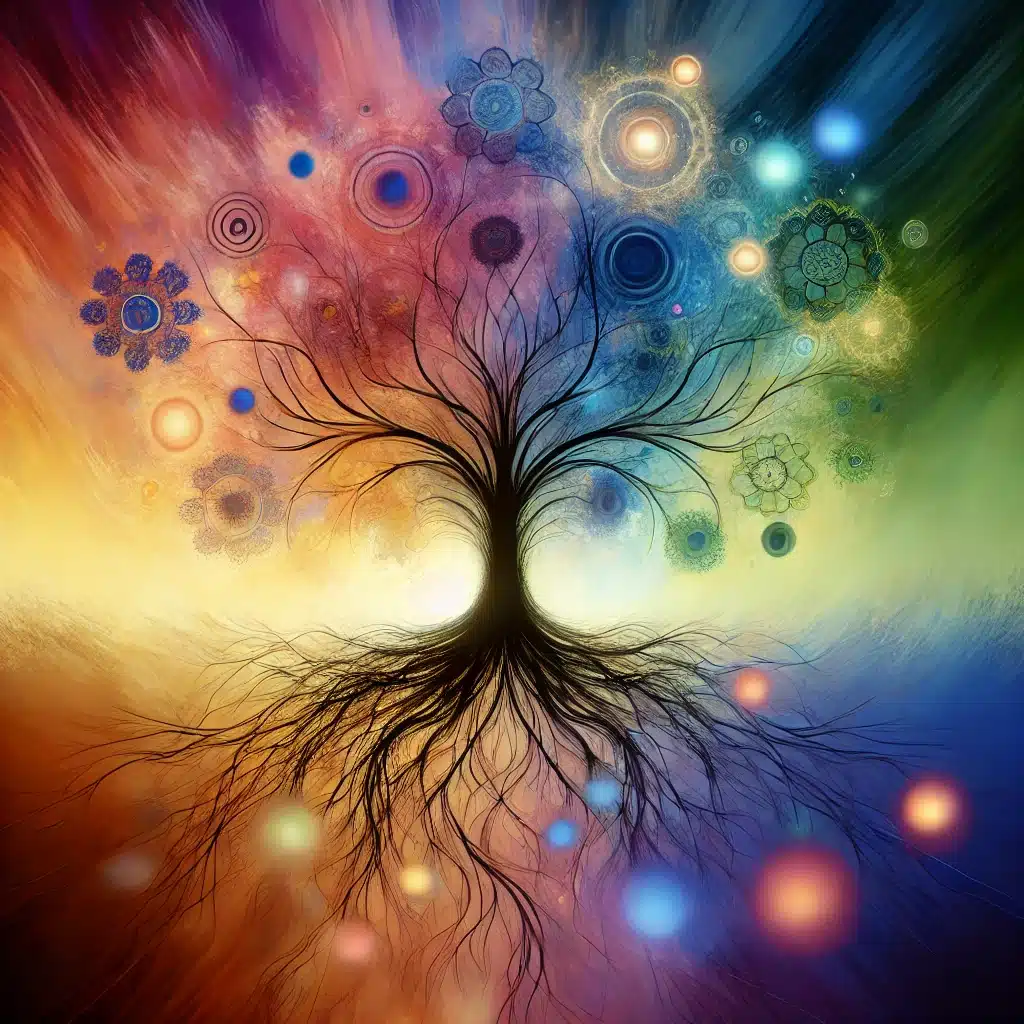Table of Contents
What Is Generational Trauma?
Generational trauma, also referred to as intergenerational or transgenerational trauma, occurs when the impact of a traumatic event or prolonged adversity is passed down from one generation to the next. This phenomenon often arises from events such as war, abuse, systemic discrimination, or significant personal losses, leaving emotional scars that ripple through family systems. For instance, children of Holocaust survivors or descendants of enslaved individuals may inherit patterns of fear, hypervigilance, or mistrust rooted in their ancestors’ experiences. These behaviors can become deeply ingrained, shaping not only individual perspectives but also how families communicate, connect, and approach emotional challenges.
The transfer of generational trauma doesn’t happen through genetics alone; it is often transmitted through learned behaviors, emotional patterns, and family narratives. Parents may unknowingly teach their children maladaptive coping mechanisms or project unresolved fears, creating cycles of stress and emotional dysfunction. For example, a parent who experienced significant childhood neglect might struggle to provide emotional availability, which can affect their child’s ability to form secure attachments. Over time, these patterns become normalized within the family, perpetuating the effects of trauma unless conscious efforts are made to break the cycle through awareness, therapy, and healing practices.
How Trauma Is Passed Down
Generational trauma is not confined to stories or distant memories; it can have a biological basis through epigenetics. Research shows that trauma can alter the way genes are expressed, influencing how future generations respond to stress. For instance, studies on descendants of Holocaust survivors and combat veterans have revealed heightened cortisol responses to stress, suggesting that trauma experienced by one generation can shape the biological stress mechanisms of the next. These genetic changes do not alter the DNA itself but affect how certain genes are “turned on” or “off,” which can have lasting impacts on mental health and resilience. This makes generational trauma a multidimensional issue, influencing individuals at both biological and psychological levels.
Beyond genetic changes, generational trauma is also passed down through learned behaviors, emotional modeling, and family communication styles. A parent with unresolved trauma might unintentionally project their fears or anxieties onto their child through overprotectiveness, avoidance of vulnerability, or unpredictable emotional reactions. For example, a parent who endured childhood neglect may struggle with emotional availability, teaching their child to suppress emotions or fear intimacy. Over time, these behaviors create an environment where maladaptive coping mechanisms are normalized, often perpetuating cycles of stress, anxiety, or distrust. Breaking this cycle requires recognizing these patterns and addressing them through self-awareness, therapy, and open dialogue.
Recognizing the Signs of Generational Trauma
Generational trauma often emerges as recurring cycles of dysfunction that persist across multiple family generations. These patterns may include addiction, abuse, neglect, or difficulties in maintaining healthy relationships. Deeply rooted feelings of inadequacy, fear, or shame can often be traced back to the unresolved traumas of earlier family members, creating a ripple effect that shapes emotional responses and behavioral tendencies. For example, a child raised in a household where emotional neglect is prevalent may grow up with difficulties expressing or identifying their own emotions, which can perpetuate similar struggles in their future relationships or parenting style. Identifying these signs helps uncover how past traumas influence present dynamics and is an essential step toward breaking the cycle.
In addition to emotional and behavioral struggles, generational trauma can manifest as chronic stress, anxiety, or difficulty regulating emotions. Family members may experience ongoing relationship conflicts, mistrust, or the inability to form secure attachments. These struggles are often compounded by a lack of awareness, as the behaviors may feel normal within the family dynamic. Recognizing these patterns requires honest reflection and, in some cases, outside intervention, such as therapy or counseling. Addressing generational trauma allows families to challenge harmful patterns and build healthier, more supportive environments for current and future generations.
The Role of Culture and History in Generational Trauma
Generational trauma often has deep roots in significant cultural or historical events that profoundly impact entire communities. Descendants of Holocaust survivors, for example, may inherit feelings of fear or hypervigilance, even without directly experiencing the atrocities themselves. Similarly, Indigenous communities still grapple with the intergenerational effects of colonization, including loss of land, culture, and language. African Americans continue to face the lingering psychological and systemic impacts of slavery and segregation. These shared experiences foster a collective memory of pain and resilience, often manifesting as emotional struggles, identity challenges, or a heightened sense of injustice. Understanding these historical and cultural contexts is critical to recognizing how past atrocities still shape mental health and societal dynamics today.
Beyond individual families, generational trauma tied to cultural and historical events can create a ripple effect that influences entire groups. For example, systemic discrimination and generational poverty can perpetuate cycles of limited opportunities, reinforcing feelings of helplessness or alienation. These shared struggles may also contribute to communal behaviors, such as distrust of authority or cultural suppression of emotions, as a way to cope with historic injustices. Acknowledging these collective experiences allows individuals and communities to engage in targeted healing practices, such as reclaiming cultural traditions, education, or collective advocacy, which can help break the cycle of generational trauma and foster a sense of empowerment and belonging.

The Impact on Mental Health
Generational trauma significantly influences mental health, contributing to conditions like depression, anxiety, and post-traumatic stress disorder (PTSD). When trauma is left unresolved, its emotional weight often permeates family dynamics, creating a tense and unpredictable environment. For example, parents dealing with unprocessed trauma may inadvertently model behaviors such as emotional withdrawal, anger, or hypervigilance, which children absorb and mirror. This can lead to a heightened state of stress and anxiety in younger generations, as they learn to adapt to the unspoken tension. The lack of open communication around these issues amplifies the emotional toll, leaving children unable to contextualize their family’s struggles, fostering feelings of confusion, fear, or self-blame instead.
The silence surrounding generational trauma further complicates mental health outcomes. When families avoid discussing past hardships, younger members are left to fill in the gaps, often misinterpreting the reasons behind certain behaviors or emotional responses. For instance, a child might internalize a parent’s distant demeanor as a reflection of their own inadequacy, leading to low self-esteem and chronic self-doubt. Over time, these unaddressed emotions can solidify into long-term mental health struggles, such as persistent feelings of shame or detachment. Breaking this cycle requires fostering open dialogue, promoting emotional literacy, and seeking professional support to address the root causes of trauma, ensuring future generations can develop healthier coping mechanisms.
How Therapy Can Help Break the Cycle
Therapy is a transformative tool for addressing and healing generational trauma, offering individuals and families a safe space to process long-held emotional wounds. Modalities such as cognitive-behavioral therapy (CBT) and trauma-focused therapy help individuals identify and reframe negative thought patterns stemming from trauma. For example, someone grappling with inherited feelings of shame or fear can, through therapy, learn healthier ways to understand and manage these emotions. Somatic experiencing, which focuses on the mind-body connection, is another effective approach. It helps individuals release trauma stored in the body, alleviating chronic tension and emotional distress. Therapists trained in trauma offer critical guidance, creating a supportive environment where clients can begin to rewrite their personal and familial narratives.
In family therapy, the process of breaking generational trauma becomes a collective effort. Open communication, guided by a professional, allows family members to share their experiences and perspectives without fear of judgment. This setting fosters understanding and accountability, paving the way for mutual healing. For example, a family struggling with unspoken resentment or grief can work toward resolving conflicts by addressing the underlying trauma together. Therapy also equips families with tools to build healthier communication patterns and emotional resilience, ensuring that harmful cycles are not perpetuated. By addressing the root causes of trauma, therapy enables individuals and families to create a new foundation of healing and connection for future generations.
The Importance of Self-Awareness
Self-awareness is a critical step in identifying how generational trauma shapes your emotions, behaviors, and relationships. It involves taking a deep, reflective look at your emotional responses, triggers, and coping mechanisms to uncover patterns that may have been inherited from past generations. For instance, repeated feelings of guilt or shame in certain situations could be tied to unresolved family trauma. Practices like journaling offer a way to document these patterns, providing clarity and perspective. Similarly, mindfulness techniques and meditation encourage individuals to remain present, creating a safe mental space for observing emotions without judgment. By fostering self-awareness, you begin to piece together how generational trauma has impacted your life and where healing is needed.
As you grow more self-aware, you can better understand the ways generational trauma influences your relationships and decision-making. For example, noticing tendencies to avoid conflict or engage in self-sabotaging behavior might reveal inherited fears or coping mechanisms passed down from parents or grandparents. Self-awareness also opens the door to emotional growth, empowering you to challenge negative thought patterns and unhealthy habits. Over time, this process of introspection and self-discovery allows you to break free from inherited cycles and establish healthier ways of interacting with yourself and others, paving the way for emotional resilience and personal transformation.

Breaking the Silence
Breaking the silence surrounding generational trauma is a powerful step toward healing. Many families carry a reluctance to openly discuss painful experiences, often due to fear, shame, or a desire to protect future generations from the weight of the past. However, creating safe spaces for open dialogue allows family members to share their stories and uncover the roots of inherited trauma. By speaking openly and without judgment, individuals can better understand the emotional wounds carried by previous generations, fostering empathy and compassion. This transparency not only strengthens family bonds but also helps reduce the stigma and secrecy that perpetuate the cycle of trauma, making room for collective healing.
Opening up about generational trauma often provides a sense of relief, as the burden of silence is lifted. For example, understanding the sacrifices or struggles faced by grandparents who lived through war or poverty can help contextualize the behaviors and coping mechanisms passed down through the family. Sharing these stories also allows younger generations to release misplaced feelings of guilt or inadequacy tied to unspoken family struggles. Through communication, families can begin to reframe their narratives, focusing on resilience and survival rather than pain and dysfunction. In doing so, they create a foundation for healthier dynamics and pave the way for emotional freedom and growth.
Building Emotional Resilience
Emotional resilience is a crucial skill in the process of healing from generational trauma. It equips individuals with the ability to navigate challenges and recover from emotional setbacks while fostering growth and adaptation. Resilience begins with developing healthy coping mechanisms, such as setting clear boundaries to protect your mental and emotional well-being. For example, limiting interactions with family members who perpetuate harmful behaviors can provide the space needed for healing. Practicing self-care—through activities like exercise, mindfulness, or creative expression—helps regulate emotions and maintain a sense of balance during difficult times. Seeking support from trusted friends, counselors, or support groups also provides valuable guidance, validation, and encouragement throughout the healing journey.
Building emotional resilience not only helps individuals overcome the effects of generational trauma but also creates a ripple effect that benefits future generations. By demonstrating healthy coping strategies and emotional regulation, parents and caregivers model positive behaviors for children, breaking the cycle of inherited patterns. For instance, teaching children how to handle stress constructively or showing them how to express emotions in a safe and open environment fosters emotional intelligence and stability. Over time, this resilience lays the groundwork for healthier family dynamics, empowering future generations to approach challenges with confidence and emotional strength.
The Role of Community Support
Community support is an invaluable resource when addressing the challenges of healing from generational trauma. Connecting with support groups, cultural organizations, or spiritual communities creates a network of individuals who understand and empathize with shared struggles. These environments foster a sense of belonging, helping individuals feel less isolated as they navigate the complexities of inherited trauma. For example, survivors of systemic oppression often find strength and healing in culturally affirming spaces where collective experiences are acknowledged and validated. In addition to emotional support, these communities may provide practical resources, such as access to counseling or workshops that empower members to confront and overcome deeply rooted generational patterns.
Beyond emotional validation, community support encourages the exchange of ideas, strategies, and hope for healing. Sharing personal stories within a group can be a cathartic experience, enabling members to better understand their experiences while learning from others who have faced similar challenges. For instance, a cultural organization that honors ancestral traditions can help individuals reconnect with their heritage, fostering pride and resilience. Similarly, spiritual communities often emphasize forgiveness, compassion, and growth, offering tools to address emotional wounds. By drawing on the strength of these shared spaces, individuals not only heal but also contribute to a broader effort to break the cycle of generational trauma within families and communities.
The Power of Forgiveness
Forgiveness is a transformative step in healing generational trauma, offering a pathway to release deep-seated emotions like anger, guilt, and resentment. It’s important to note that forgiveness doesn’t excuse harmful actions but rather allows individuals to reclaim emotional freedom from the weight of past pain. When families carry unresolved anger or resentment, these emotions can create lasting tension and perpetuate cycles of conflict. By choosing forgiveness, individuals break this cycle, fostering healthier family dynamics and opening the door for meaningful connection. For instance, acknowledging the hardships faced by previous generations and understanding their actions through a lens of empathy can help reduce blame and pave the way for reconciliation.
Forgiveness also plays a crucial role in personal healing by freeing emotional space for peace, growth, and self-compassion. Holding onto bitterness or anger can affect mental health, contributing to stress, anxiety, or depression. In contrast, letting go through forgiveness allows individuals to focus on building resilience and creating a more positive future. Self-forgiveness is equally important in this process, especially for those who feel guilt over continuing harmful patterns they may have inherited. This step acknowledges that breaking free from generational trauma is a journey, and making mistakes is part of the process. Ultimately, forgiveness empowers individuals and families to heal together, fostering a legacy of emotional strength and understanding for future generations.

Creating a Legacy of Healing
Addressing generational trauma is more than breaking harmful cycles; it’s about creating a lasting legacy of love, resilience, and emotional well-being for future generations. When families actively work to heal, they set the stage for healthier communication and deeper connections, allowing a more supportive environment for growth. Modeling behaviors like empathy, emotional regulation, and open dialogue can teach children and other family members how to navigate challenges constructively. For example, a parent who fosters emotional intelligence in their children helps them develop the tools to process and manage their own feelings, reducing the likelihood of perpetuating the trauma. In this way, the family dynamic shifts toward one rooted in mutual respect and understanding.
Creating this new legacy requires intentionality and a commitment to fostering positive change. Healing generational trauma isn’t just about resolving pain from the past—it’s about building a future that prioritizes well-being and balance. Families can embrace practices like celebrating small wins together, expressing gratitude, or seeking family therapy to maintain healthy dynamics. The effects of these efforts ripple outward, not only benefiting the immediate family but also influencing extended relatives and community interactions. By breaking cycles of dysfunction, individuals become agents of change, setting a powerful example that healing is possible and leaving a legacy where love and understanding take precedence over inherited wounds.
Moving Toward Generational Healing
Generational trauma is a deeply ingrained issue that impacts not just individuals but entire families and communities, creating cycles of pain that can persist for decades. However, the journey toward healing offers a profound opportunity for growth and transformation. Seeking professional support through therapy, whether individually or as a family, provides the tools to confront unresolved pain and build healthier emotional habits. Developing self-awareness is equally important, as it helps identify harmful patterns and triggers that have been passed down through generations. For example, recognizing tendencies toward fear or avoidance in relationships can help you consciously choose more constructive ways to connect with others, breaking the cycle for future generations.
Healing generational trauma is not solely about confronting past wounds—it is about creating a hopeful and resilient path forward. Fostering open communication within families allows for the sharing of stories, emotions, and understanding, ultimately building empathy and trust. By modeling healthy behaviors and prioritizing emotional intelligence, you set the groundwork for a future defined by unity, strength, and support rather than inherited struggles. The process may take time and effort, but the rewards—a legacy of love, resilience, and hope—extend beyond your immediate family to future generations, creating a ripple effect of healing and empowerment.



